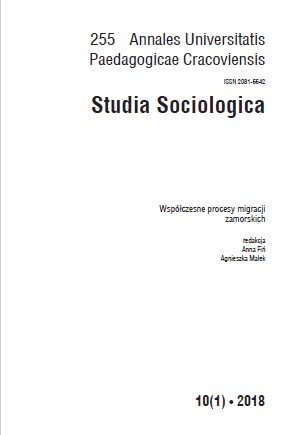Starzenie się w etnicznej enklawie. Polscy imigranci na Greenpoincie. Komunikat z badań
Aging in an ethnic enclave. Polish immigrants in Greenpoint
Author(s): Karolina Łukasiewicz, Ewa Dżurak, Ewa Maliga, Marta Pawlaczek, Izabela BarrySubject(s): Politics and society, Migration Studies, Inter-Ethnic Relations, Ethnic Minorities Studies
Published by: Wydawnictwo Uniwersytetu Komisji Edukacji Narodowej w Krakowie
Keywords: Aging; immigration; international migration; ethnic enclave; social policies;
Summary/Abstract: This article presents the results of a research on the challenges and opportunities open to elderly migrants living in the largest and oldest Polish neighborhood of New York City, Greenpoint in Brooklyn. This study was conducted between June 2015 and December 2016. The research material consisted of observations made in senior centers, as well as data based on 32 interviews conducted with people who were already retired at the time of the interviews and left Poland around the age of 50. Some study participants struggled due to limited possibilities to return to Poland, a lack of basic benefits resulting from being undocumented, and/or poverty. They also suffered with isolation resulting from the lack of participation in American culture or depression common for the elderly age. Those who had a legal stay in the US appreciated the benefits of access to federal and local (state and municipal) social services for the elderly, including high-quality health care, subsidized housing, senior centers and food stamps. Seniors also appreciated the benefits of living in the enclave, Greenpoint, including access to services offered in Polish and to familiar Polish products. The challenges associated with aging in a society without many of the traditions of Polish culture were mitigated to some extent by redefining the traditional social roles assigned to older people. Most of the respondents decided to lead an active lifestyle, despite in many cases a lack of close family members and family structure. So rather than having roles largely defined by children and grandchildren, the seniors made intense and close social contacts with their peers in Polish senior centers. Some of them married here, or focused on travel, some tried to work a few hours a week with the intention of helping the remaining family in Poland.
Journal: Annales Universitatis Paedagogicae Cracoviensis. Studia Sociologica
- Issue Year: X/2018
- Issue No: 1
- Page Range: 47-59
- Page Count: 13
- Language: Polish

